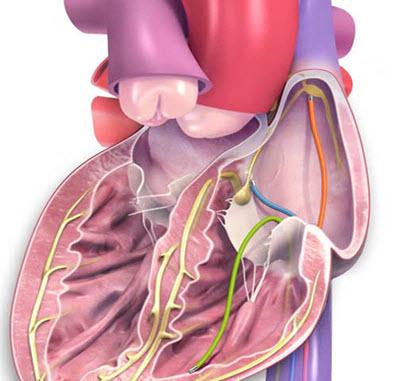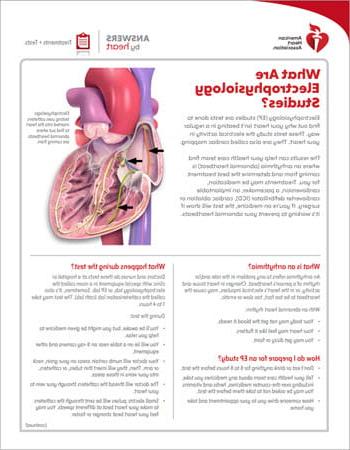Electrophysiology Studies
电生理学研究(EP研究)是帮助医生了解心律异常原因的测试(arrhythmias).

电生理测试使用插入心脏的导管来发现异常心跳的来源.
During an EP study, 一根叫做导管的细管被插入到通往心脏的血管中. 然后在心脏中放置专门的电极来发送电信号并测量心脏中的电活动.
EP studies are used to see:
- Where an arrhythmia is coming from.
- How well certain medicines work to treat your arrhythmia.
- 是否通过破坏心脏内部引起异常电信号的地方来治疗问题. This procedure is called catheter ablation.
- If a pacemaker or implantable cardioverter defibrillator (ICD) might help you.
- If you are at risk for heart problems such as fainting or sudden cardiac death due to cardiac arrest.
What are the risks of EP studies?
In most cases, the procedure is very safe. Discuss this with your health care professional. Some possible risks may include:
- Arrhythmia. 在EP学习期间,你可能会有不正常的心律,使你头晕. 如果发生这种情况,你的医生可能会给你的心脏电击以恢复正常的心跳.
- Heart attack (myocardial infarction) and stroke
- Heart valve damage
- 血凝块有时会在导管的尖端形成,破裂并阻塞血管. 你的医生可能会给你一些预防血栓的药物.
- 导管插入部位(腹股沟、手臂或颈部)感染、出血和瘀伤. 你的医生或护士会帮助你避免这些问题.
How do I prepare for the test?
- 考试前6至8小时内不要吃或喝任何东西.
- Tell your doctor about any medicines you take, including over-the-counter medicines, herbs and vitamins. 他或她可能会要求你在考试前不要参加考试. 不要停药,除非你的医生告诉你.
- 让别人开车送你去看医生,然后送你回家.
- 如果你经常戴助听器,在手术过程中也要戴上. If you wear glasses, bring them to your appointment.
What happens during the EP study?
At a hospital or clinic, 医生和护士在一个有特殊测试设备的房间里做心电图研究. 你可能听说过这个房间叫做电生理实验室,或EP实验室. Some call it the catheterization laboratory (cath lab). During the test:
- A nurse will put an IV (intravenous line) in your arm. 你会得到帮助你放松的药(镇静剂). 但在测试过程中,你会保持清醒,并能按照指示去做.
- 你的护士会清洁并刮掉医生工作的部位. 这通常发生在腹股沟,但也可能发生在手臂或颈部.
- 你会被打一针——局部麻醉剂——使这个区域麻木. 你的医生会用针穿过你的皮肤进入血管. 一根稻草大小的管叫做鞘,将被插入你的动脉或静脉. 医生会轻轻地引导几根专门的心电导管穿过血管鞘进入你的血管,并将它们推进你的心脏. 视频屏幕将显示导管的位置. 你可能会在插入鞘的地方感觉到一些压力, but you shouldn’t feel any pain.
- 你的医生会通过导管发送小的电脉冲,使你的心脏以不同的速度跳动. You may feel your heart beat stronger or faster.
- 心脏产生的电信号将被特殊的导管接收并记录下来. 这就是所谓的心脏测绘,可以让医生定位心律失常的来源.
- Your doctor will remove the catheters and the IV line. 你的护士会按压穿刺部位以止血.
- The test usually lasts 1 to 4 hours.
如果确定了心律失常的类型和位置,并确定了适当的治疗方法, 心脏消融术或植入心脏起搏器或ICD可在心电检查期间或之后立即进行.
What happens after the test?
You’ll be moved to a recovery room for 1 to 3 hours. During this time:
- Stay still as long as your nurse tells you to. 一定要保持测试所用的手臂或腿伸直.
- 护士会检查穿刺处是否出血或肿胀.
- Before you leave, you’ll be told what to do at home.
What happens after I get home?
Follow the instructions your nurse or doctor gave you, 包括服用医生开的新药. 大多数人可以在测试后4到6小时内开始进食和服药. 大多数人可以在考试后的第二天进行日常活动. Don’t drive for at least 24 hours.
The puncture site may be sore for several days. A small bruise at the puncture site is normal. 如果患处开始出血,平躺并紧紧按压患处. Have someone call the doctor or EP lab.
What should I watch for?
Call 911 if you notice:
- 胸部疼痛或紧绷的任何症状或中风的迹象(面部下垂), arm weakness, speech difficulties).
- A sudden increase in swelling around the puncture site.
- 当你用力按压患处时,出血并没有减缓.
Call your doctor right away if you notice:
- 放置导管的手臂或腿部感到麻木或刺痛.
- 受影响的手或脚感觉很冷或变色.
- The puncture site looking more and more bruised.
- 穿刺部位开始肿胀或有液体流出.
- Fever
- Shortness of breath
When will I know the results of my EP study?
Most of the time, 您的医疗保健专业人员会要求您预约讨论您的测试结果. 你们会在预约时讨论治疗方案.
Download a printable sheet: What are Electrophysiology Studies? (PDF)






